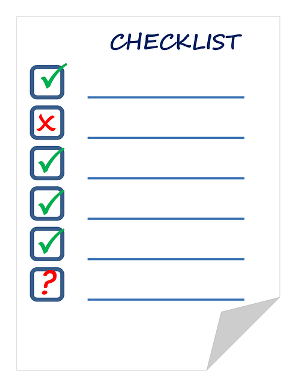 Before you visit your attorney to discuss a personal injury claim, you will want to assemble a number of documents and collect some information on the incident. This article offers a checklist that you can use in preparing for most any personal injury claim.
Before you visit your attorney to discuss a personal injury claim, you will want to assemble a number of documents and collect some information on the incident. This article offers a checklist that you can use in preparing for most any personal injury claim.
Information to Provide:
Be ready to provide many, many specific pieces of information about the accident, the victims, the investigation and any medical treatment you received.
Accident Information – Be ready to provide information on who was at the accident scene, the company that transported you to the hospital, how many days of work you’ve missed, the names and addresses of witnesses, and the name and phone number of the insurance adjuster you spoke with.
Victim Information – Of course the attorney will need the names and contact information of everyone who was involved in the accident. The extent of their injuries may become relevant later. Their account of what happened and how will certainly be important later.
Police Information – If you have contact information for investigating police officers, give the attorney that information. You should also be able to get a copy of the official accident report sent to your attorney.
Medical Contact Information – If the accident was serious, you probably went to the emergency room or at least a walk-in clinic. The lawyer will also want the name and address of any medical professional who saw you for treatment or a checkup. If you went to a walk-in clinic or the emergency room or your family doctor, bring their contact information to the lawyer’s office. You should also need to supply the dates of each visit. If you were supposed to visit two specialists and went to each one, for example, the attorney will need documentation of that fact. Any law firm will need a long list of medical and insurance documentation as well.
Documents to Bring:
To prepare for your case, the lawyer will also need some documentation on the incident. All of the documents can be vital in making a strong case for compensation.
Insurance – Bring any insurance documents that are relevant, car insurance for a car accident for example. If you have catastrophic care or disability insurance and that is relevant, bring the documentation. Your attorney will need to know the terms and coverage limits on all types of insurance that are relevant to your situation. If you have disability or veteran’s insurance bring those documents.
Home or Rental – If the accident happened in a home, bring homeowner’s insurance or renter’s insurance information. You’ll also want to bring the declarations and coverage pages for those insurance policies.
Incident Documentation – Bring documents related to the incident. The attorney will also want an accident report and witness statements, medical bills, and all correspondence from the insurance company. If there is CCTV footage or even a cell phone video you should be able to get them. Ideally, you would contact the business in writing and request the CCTV footage.
Receipts for Medical Bills – Bring receipts for any products or services you bought due to the accident. If you had to spend money on medical devices, crutches, or anything similar, bring the receipts.
Receipts for Non-medical Expenses – If you had to fix anything because of the accident, bring those receipts as well. If you need emergency car repairs, bring those bills. Receipts for OTC pain medicine, bandages and braces are also relevant so bring those too. If you replaced a mangled bicycle bring the receipt. If there are other things you need to bring, based on your situation or the specific type of injury case, your attorney can let you know before the meeting.

